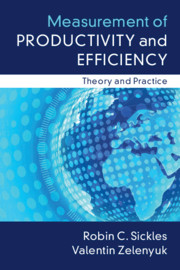Book contents
- Frontmatter
- Dedication
- Contents
- List of Figures
- List of Tables
- Preface
- Acknowledgments
- Introduction
- 1 Production Theory: Primal Approach
- 2 Production Theory: Dual Approach
- 3 Efficiency Measurement
- 4 Productivity Indexes: Part 1
- 5 Aggregation
- 6 Functional Forms: Primal and Dual Functions
- 7 Productivity Indexes: Part 2
- 8 Envelopment-Type Estimators
- 9 Statistical Analysis for DEA and FDH: Part 1
- 10 Statistical Analysis for DEA and FDH: Part 2
- 11 Cross-Sectional Stochastic Frontiers: An Introduction
- 12 Panel Data and Parametric and Semiparametric Stochastic Frontier Models: First-Generation Approaches
- 13 Panel Data and Parametric and Semiparametric Stochastic Frontier Models: Second-Generation Approaches
- 14 Endogeneity in Structural and Non-Structural Models of Productivity
- 15 Dynamic Models of Productivity and Efficiency
- 16 Semiparametric Estimation, Shape Restrictions, and Model Averaging
- 17 Data Measurement Issues, the KLEMS Project, Other Data Sets for Productivity Analysis, and Productivity and Efficiency Software
- Afterword
- Bibliography
- Subject Index
- Author Index
6 - Functional Forms: Primal and Dual Functions
Published online by Cambridge University Press: 15 March 2019
- Frontmatter
- Dedication
- Contents
- List of Figures
- List of Tables
- Preface
- Acknowledgments
- Introduction
- 1 Production Theory: Primal Approach
- 2 Production Theory: Dual Approach
- 3 Efficiency Measurement
- 4 Productivity Indexes: Part 1
- 5 Aggregation
- 6 Functional Forms: Primal and Dual Functions
- 7 Productivity Indexes: Part 2
- 8 Envelopment-Type Estimators
- 9 Statistical Analysis for DEA and FDH: Part 1
- 10 Statistical Analysis for DEA and FDH: Part 2
- 11 Cross-Sectional Stochastic Frontiers: An Introduction
- 12 Panel Data and Parametric and Semiparametric Stochastic Frontier Models: First-Generation Approaches
- 13 Panel Data and Parametric and Semiparametric Stochastic Frontier Models: Second-Generation Approaches
- 14 Endogeneity in Structural and Non-Structural Models of Productivity
- 15 Dynamic Models of Productivity and Efficiency
- 16 Semiparametric Estimation, Shape Restrictions, and Model Averaging
- 17 Data Measurement Issues, the KLEMS Project, Other Data Sets for Productivity Analysis, and Productivity and Efficiency Software
- Afterword
- Bibliography
- Subject Index
- Author Index
Summary
Implementing the theoretical constructs of production and its efficient application, a subject discussed in previous chapters, requires that we specify estimable and parsimonious parametric or nonparametric relationships. This allows the practitioner to utilize standard regression, linear programming, or formal kernel-based or other nonparametric techniques to estimate the relative contributions of different factors of production to single or multiple outputs produced under the control of a firm. It also allows one to model substitution possibilities, returns to scale, returns to scope, productivity change, and many other production-related summary measures of a technology. In this chapter and in Chapters 11–16, we will focus primarily on the econometric estimation of production relationships and we will need to distinguish between linear programming methods, which are often referred to as nonparametric, and kernel-based methods or methods that are based on series expansions, which are typically referred to as nonparametric in the econometrics and in much of the classical statistics literature. In order to maintain this distinction, we will use the term “nonparametric econometric” approaches when referring to kernel-based methods and methods based on series expansions when appropriate.
Duality among production, cost, revenue, and profit functions places restrictions on the functional relationships. These restrictions, such as linear homogeneity, concavity or convexity, and symmetry, need to be imposed in a natural and relatively transparent way. Also, to the extent that random errors are introduced into the optimization process, the stochastic portion of the production models needs to be consistent with the optimization assumptions used to generate side conditions based on assumptions of cost minimization, output maximization, and/or profit or expected profit maximization. These side conditions provide the researcher additional degrees of freedom. The additional degrees of freedom allow one to estimate meaningful relationships that exploit second-order (and higher) terms and allow for flexibility in modeling a technology.
The additional information contained in the optimizing assumptions comes at a cost, however. If the assumptions are not valid or the side conditions cannot be properly embedded within a parametric or a nonparametric econometric specification of technology or its dual forms, then biased estimates of the technology may be generated. Moreover, nonparametric econometric specifications may not be consistent with the regularity conditions needed to ensure that a dual representation of the technology has in fact been estimated.
- Type
- Chapter
- Information
- Measurement of Productivity and EfficiencyTheory and Practice, pp. 166 - 206Publisher: Cambridge University PressPrint publication year: 2019



